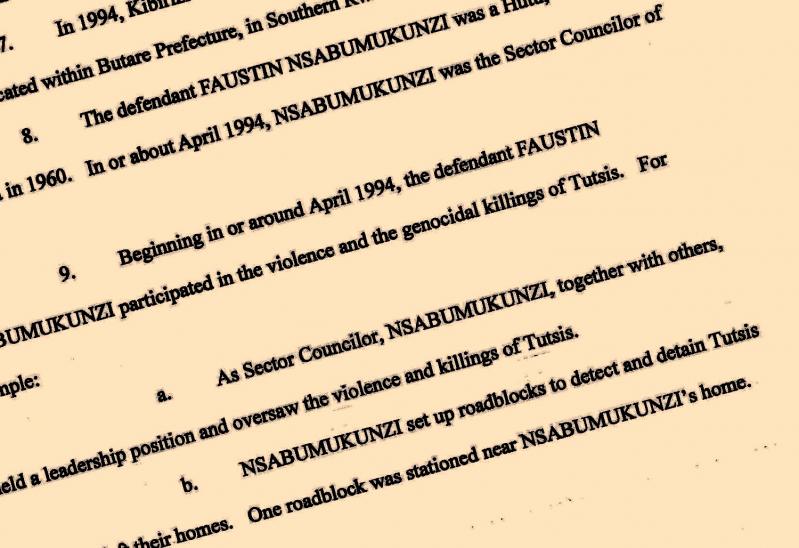Faustin Nsabumukunzi’s alleged past caught up with him last Thursday, when the Bridgehampton beekeeper was arrested and charged with immigration fraud for concealing his role in the Rwandan genocide more than 30 years ago.
An indictment unsealed at the federal courthouse in Central Islip charged Mr. Nsabumukunzi, 65, with visa fraud and attempted naturalization fraud for lying on his applications for a green card and for United States citizenship by hiding his position as a local leader and perpetrator of violence during the 1994 genocide. He was arraigned before United States District Judge Joanna Seybert. If convicted on all counts, Mr. Nsabumukunzi faces a maximum of 30 years in prison.
According to court filings, in 2008 Mr. Nsabumukunzi was tried and convicted in absentia in a community-based Rwandan court and given a life sentence. In 2014, the public prosecutor of Rwanda indicted him for crimes related to the genocide, and in 2016, Interpol Rwanda issued a Wanted Person Diffusion Notice against him for the crime of genocide.
In a statement issued by the United States Department of Justice, United States Attorney John J. Durham said that Mr. Nsabumukunzi “repeatedly lied to conceal his involvement in the horrific Rwandan genocide while seeking to become a lawful permanent resident and citizen of the United States.”
“For over two decades, he got away with those lies and lived in the United States with an undeserved clean slate, a luxury that his victims will never have, but thanks to the tenacious efforts of our investigators and prosecutors, the defendant finally will be held accountable for his brutal actions.”
“As alleged, the defendant participated in the commission of heinous acts of violence abroad and then lied his way into a green card and tried to obtain U.S. citizenship,” Matthew R. Galeotti of the Justice Department’s Criminal Division said in the same statement. “No matter how much time has passed, the Department of Justice will find and prosecute individuals who committed atrocities in their home countries and covered them up to gain entry and seek citizenship in the United States.”
“Because the defendant faces severe consequences should he be convicted and deported, the evidence against him is strong, and he frequently travels internationally and likely has contacts in foreign countries, he is a significant risk of flight,” the Justice Department said in arguing for his detention pending trial.
Mr. Nsabumukunzi pleaded not guilty last Thursday, and “was released on a $250,000 bond,” according to The New York Times. The Times reported that his lawyer, Evan Sugar, had said in court “that the American government’s case relied on evidence about an event in which facts are murky. He pointed out that Mr. Nsabumukunzi was never indicted by the United Nations international court for genocide.”
Mr. Sugar could not be reached for comment this week.
Rwanda gained independence from Belgium in 1962 after decades of rule, upon which the majority Hutus “consolidated power and facilitated widespread discrimination,” systematically denying the minority Tutsi educational and career opportunities, according to the University of Minesota’s Center for Holocaust and Genocide Studies. A growing ideology in which Tutsi were seen as foreign and inferior was exploited to incite the genocide.
Tension between the ethnic groups exploded when the plane carrying the Rwandan president Juvenal Habyarimana, a Hutu, was shot down by a surface-to-air missile on April 6, 1994. Over the next 100 days, an estimated 800,000 ethnic Tutsis and moderate Hutus were killed.
According to grand jury charges, Rwanda was composed of 11 prefectures in 1994, each divided into “communes,” which were in turn divided into “sectors,” each of which was administered by a sector councilor. When the genocide began, Mr. Nsabumukunzi, according to the charges, was the sector councilor of Kibirizi, within the commune of Nyaruhengeri, located within Butare Prefecture, in southern Rwanda.
Between April and July of that year, members of the Hutu population committed acts of violence including murder, rape, and sexual violence against the Tutsis. The government alleges that Mr. Nsabumukunzi set up roadblocks, one of which was near his residence, to detect and detain Tutsis when they left their homes, and directed groups of armed Hutus to kill Tutsis. On or about April 21, 1994, he allegedly “directed a group of armed Hutu men to kill a group of Tutsis who were gathered on the grounds of the administrative office” for Nyaruhengeri commune, and subsequently “participated in the violence, including by hitting Tutsis in the head with a club.”
According to the Department of Justice statement, his actions included ordering a group of armed Hutus to locations where Tutsis were sheltering. The Tutsis were killed there. Mr. Nsabumukunzi is also alleged to have facilitated the rape of Tutsi women by verbally encouraging Hutu men to do so.
The Justice Department further says that Mr. Nsabumukunzi applied for refugee resettlement in the United States in August 2003, applied for and received a green card in November 2007, and later submitted applications for naturalization in 2009 and 2015, but allegedly lied to immigration officials to gain admission to the United States as a refugee by falsely denying in the applications under penalty of perjury that he ever engaged in genocide; ordered, incited, assisted, or participated in the harm of anyone because of their race, religion, nationality, ethnic origin, or political opinion, or sought entry into the United States or any other immigration benefit by fraud or willful misrepresentation of a material fact.
Those lies were repeated, according to the indictment, in his subsequent applications for a green card and for naturalization. As a result of concealing his actions during the genocide, Mr. Nsabumukunzi has been able to live and work in the United States since 2003.
The New York Times reported in 2006 that he was working at Hamptons Honey in Water Mill, and that he had taught apiculture, or beekeeping, at universities and developed a new type of bee box that became widely used in Africa. In Rwanda, he had supervised a team of 150 beekeepers and 1,500 hives, according to The Times.
Reached by telephone on Tuesday, Gabriel Alfaya, the owner of the Hamptons Honey Company since 2009, said that Mr. Nsabumukunzi’s employment there preceded his ownership of the company. He has never met or spoken with Mr. Nsabumukunzi, he said.
The Star reported in 2022 on a fire that destroyed the Bridgehampton house where Mr. Nsabumukunzi, his wife, and their children lived, along with nearly all of their possessions. GoFundMe campaigns were launched to benefit Mr. Nsabumukunzi’s wife, Agnes Mujawayezu, who worked at Stony Brook Southampton Hospital, and the rest of the family. The campaigns collectively raised more than $40,000.
“This defendant has been living in the United States for decades, hiding his alleged horrific conduct, human rights violations, and his role in these senseless atrocities against innocent Tutsis,” Darren B. McCormack, acting special agent in charge, Homeland Security Investigations, said in the Justice Department’s statement. “The depraved conduct of which the defendant is accused represent the worst of humanity. As demonstrated through the tireless work of H.S.I. New York agents, analysts, and task force officers, we will never tolerate the safe-harboring of individuals linked to such unimaginable crimes.”
--
Note: This article has been updated since it originally appeared online.



